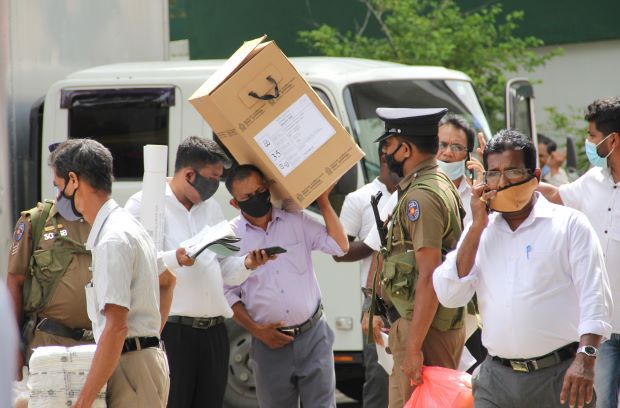Sri Lanka election could return a winner without 50% votes
COLOMBO – With three serious contenders in Sri Lanka’s 2024 presidential election, there is a strong possibility that no candidate will cross the 50% mark to win outright, but the country could still have a new president.
Since the presidential system was introduced in line with the 1978 Constitution, every presidential election has produced a winner who secured more than 50% of the valid votes, thus avoiding the need to count second and third preferences.
Article 94 of the Constitution outlines the process for selecting a winner should no candidate cross the halfway mark. If necessary, candidates may have to resort to their calculators to determine how many votes they need to secure victory.
Complicated counting
Voting is based on a ranking of preferences from 1 to 3, although a voter simply marking an ‘X’ in front of the name of their choice is also acceptable as a valid vote. A voter may mark ‘1’, ‘2’, and ‘3’ in the order of their preference for any three candidates out of the 39 on the ballot paper.
A voter may even mark ‘1’ and ‘2’ and omit a ‘3’, and the vote will still be valid. So far, no political party or independent candidate has campaigned on the basis of asking for a vote while instructing voters to mark a second or third preference.
Counting
Should the dreaded scenario arise after September 21, with no candidate passing the halfway mark, election officials will eliminate all candidates except the top two.
The second preferences marked on the eliminated ballots will then be counted and added to the votes of the top two, provided there are any second preferences on the eliminated ballots.
If, there is no second preference for one of the top two candidates, the third preference in that ballot will be counted as a vote – provided the third preference is marked for one of the top two candidates.
At this stage, the candidate with the highest number of votes will be declared elected.
Should Sri Lanka face a second and third preference count after the Sept 21 election, it could raise questions of legitimacy, as the electorate has no experience of such a situation. The new leader would also have a weak mandate, albeit a constitutionally legitimate one.
Nevertheless, if the winner is determined by a very narrow margin, it could lead to calls for recounts and even allegations of rigging.
Tie
The Constitution also provides for a situation where the top two candidates could end up in a tie. Should that occur, the Election Commission will draw lots. It would indeed be a luck-by-chance election.
The provisions in the Constitution relating to the presidential election – Article 97 – must be read together with the Presidential Elections Act of 1981.
Here is Article 94 of the Constitution in full:
- (1) At the election of the President every voter while casting his vote for any candidate may –
(a) where there are three candidates for election, specify his second preference; and
(b) where there are more than three candidates for election, specify his second and third preferences.
(2) The candidate, if any, who receives more than one-half of the valid votes cast shall be declared elected as President.
(3) Where no candidate is declared elected under paragraph (2) of this Article, the candidate or candidates, other than the candidates who received the highest and second highest number of such votes, shall be eliminated from the contest, and –
(a) the second preference of each voter whose vote had been for a candidate eliminated from the contest, shall, if it is for one or the other of the remaining two candidates, be counted as a vote for such candidate and be added to the votes counted in his favour under paragraph (2); and
(b) the third preference of each voter referred to in sub-paragraph (a) whose second preference is not counted under that sub-paragraph shall if it is for one or the other of the remaining two candidates, be counted as a vote for such candidate and be added to the votes counted in his favour under sub-paragraph (a) and paragraph (2),
and the candidate who receives the majority of the votes so counted shall be declared elected as President.
(4) Where equality is found to exist between the votes received by two or more candidates and the addition of one vote would determine –
(a) which candidate is to be declared elected under this Article; or
(b) which candidate is not to be eliminated under this Article,
then the determination of the candidate to whom such additional vote shall be deemed to have been given for the purpose of such determination shall be made by lot.
-economynext.com



Comments are closed, but trackbacks and pingbacks are open.